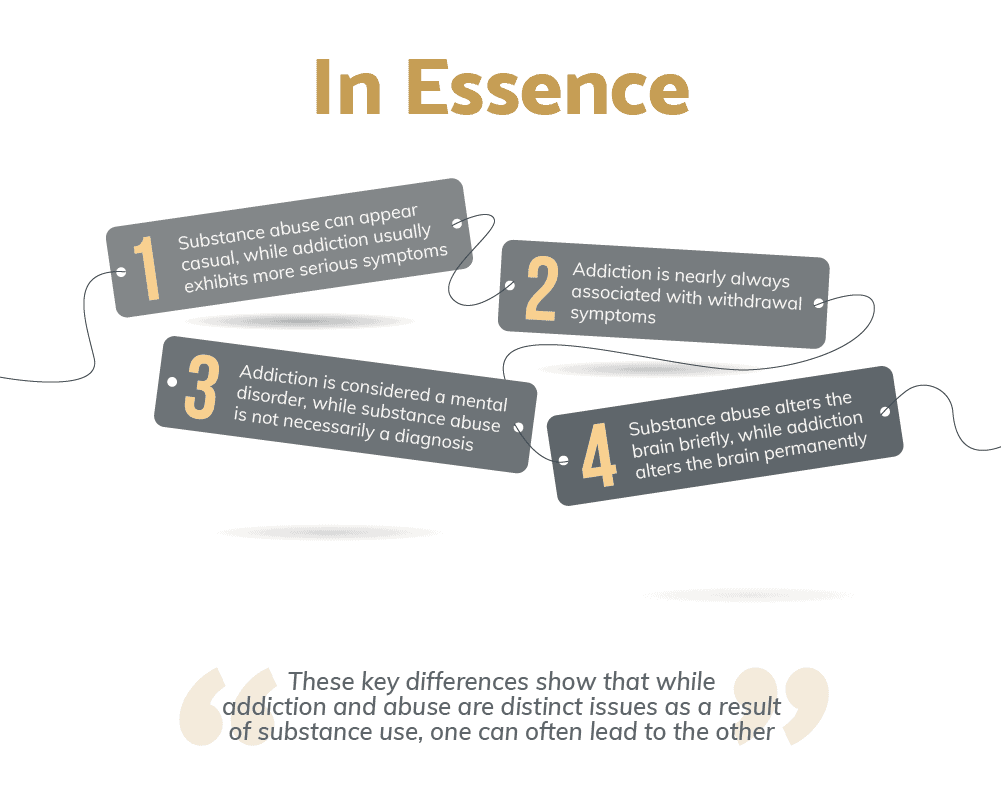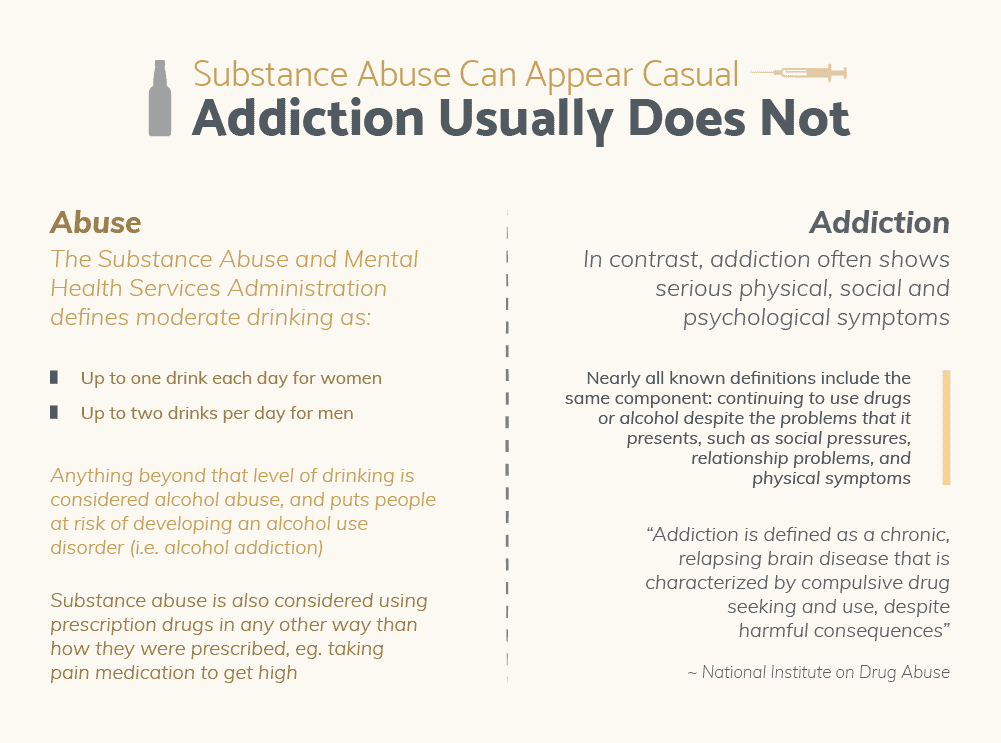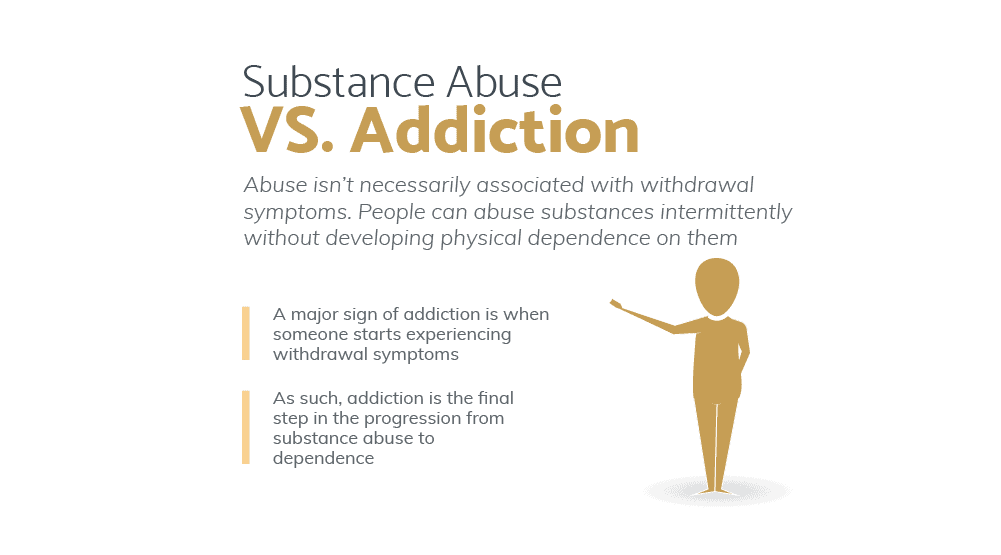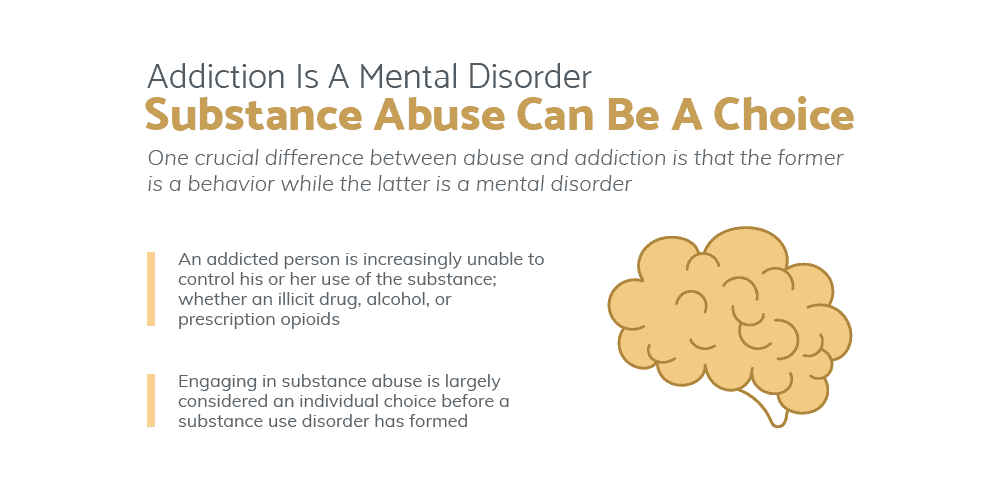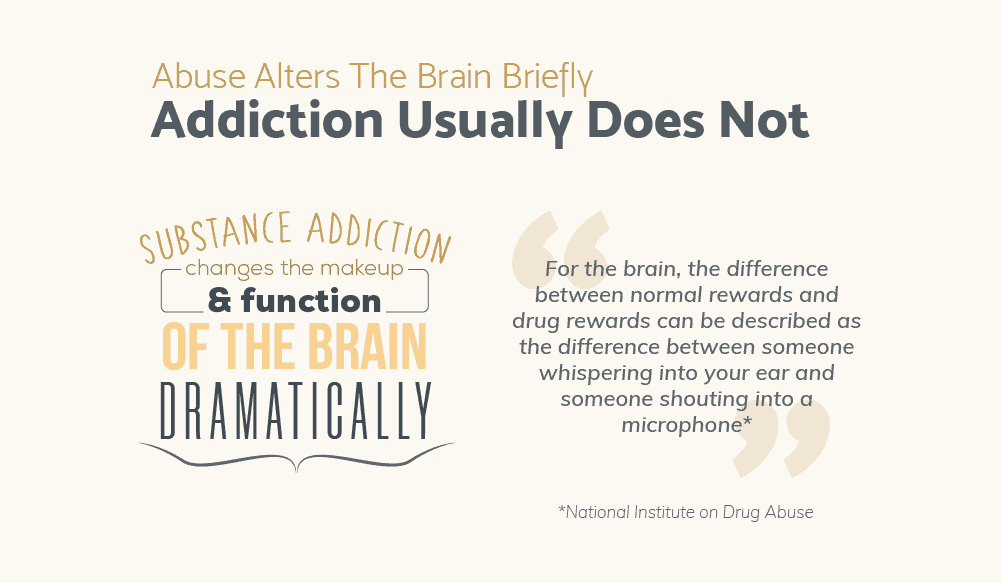“We know that you use substances to alter your mood, to cover up your sadness, to ease your heartbreak, to lighten your stress load, to blur your painful memories, to escape your hurtful reality, or to make your unbearable days or nights bearable.”
~ Chris Prentiss, The Alcoholism and Addiction Cure
There is often confusion between substance abuse versus substance addiction. Both abuse and addiction present a whole host of social, psychological and physical problems for the person who is struggling with these facets of substance use. However, it is important to understand the key differences between what constitutes substance abuse and what full-blown addiction looks like. The two are commonly confused, and even sometimes used interchangeably.
The major question addressed in this post has to do with the major differences between abuse and addiction.
In addressing this question, this post outlines the four major differences between substance addiction versus substance abuse, both of which can take many different forms:
- Substance abuse can appear casual, while addiction usually exhibits more serious symptoms
- Addiction is nearly always associated with withdrawal symptoms
- Addiction is considered a mental disorder or disease, while substance abuse is not necessarily a diagnosis
- Substance abuse alters the brain briefly, while substance addiction alters the brain permanently
“We accept many health insurance plans. Take a look at our Outpatient Program.”
While there are several key differences between these two different forms of substance problems, it is not necessarily a straightforward topic to address. Because of this, the post also addresses several follow up questions in addition to the main question posed above. These follow up questions include:
- Are both substance abuse and substance addiction considered diseases?
- How can you tell the difference between abuse and addiction?
- Are withdrawals symptoms a sign of drug abuse or addiction?
- How do substance abuse and substance addiction affect the brain and the body?
- How can you get help for either addiction or substance abuse?
Each of these follow up questions helps clarify the four major differences between abuse and addiction discussed here. Taken altogether, these key differences show that while addiction and abuse are distinct issues as a result of substance use, one can often lead to the other.
Substance Abuse Can Appear Casual – Addiction Usually Does Not
Many people may be surprised to learn what is considered substance abuse from a health perspective. Some may think that abuse of substances occurs only when substance use exhibits specific problems. The truth is substance abuse can appear quite casual. For instance, the Substance Abuse and Mental Health Services Administration defines moderate drinking as up to one drink each day for women and up to two drinks per day for men. Anything beyond that level of drinking is considered alcohol abuse, and puts people at risk of developing an alcohol use disorder (i.e. an addiction to alcohol). Similarly, substance abuse is also considered using prescription drugs in any other way than how they were prescribed. Taking pain medication to get high, in other words, is considered a form of substance abuse. Take Ashwood Recovery’s addiction quiz, or consider getting a more formal addiction assessment, to help determine if a substance use disorder is present. In contrast, addiction often shows serious physical, social and psychological symptoms. While there are many different definitions of addiction, nearly all of them include the same component: continuing to use drugs or alcohol despite the problems that it presents. These problems can include social pressures, relationship problems, physical symptoms, and more. For example, one government agency defines substance addiction as follows:
“Addiction is defined as a chronic, relapsing brain disease that is characterized by compulsive drug seeking and use, despite harmful consequences. It is considered a brain disease because drugs change the brain; they change its structure and how it works. These brain changes can be long lasting and can lead to many harmful, often self-destructive, behaviors.”
~ National Institute on Drug Abuse
In other words, substance is a mental disease that affects many different areas of a person’s life. It can be much harder to hide than substance abuse, and is generally longer lasting. Substance abuse can appear casual, since it is defined by how a substance is used; in contrast, substance addiction has more to do with one’s behaviors, physical withdrawal, and psychological state of mind.
Substance Abuse vs. Addiction: Look for the Withdrawal Symptoms
One of the major signs of addiction is when someone begins to experience withdrawal symptoms when they go too long without drinking alcohol or taking drugs. Abuse of alcohol, prescription medication or illicit drugs is not necessarily associated with withdrawal symptoms, since these substances can be abused on an intermittent basis and without the development of physical dependence on their effects. In contrast, addiction is the final step in the progression from substance abuse to dependence. While there is a difference in definition between physical dependence and addiction, the two often go hand in hand.
“Withdrawal refers to the physical problems and emotions you experience if you are dependent on a substance (such as alcohol, prescription medicines, or illegal drugs) and then suddenly stop or drastically reduce your intake of the substance. Symptoms of withdrawal are caused by decreased amounts of alcohol or drugs in the blood or tissues of a person who has grown accustomed to prolonged heavy use and who then suddenly stops. Withdrawal syndrome is a set of symptoms that occur when you decrease or stop drinking or using drugs after using alcohol or drugs for a long time.”
~ WebMD Magazine
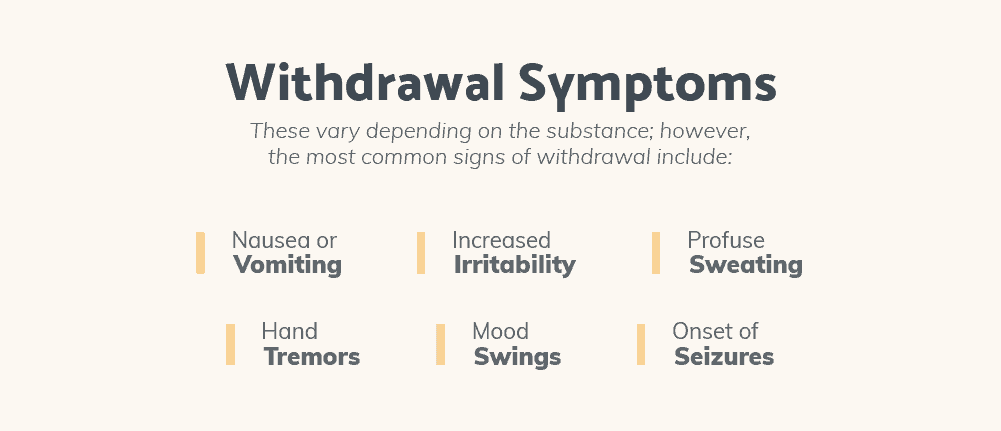
- Nausea or vomiting
- Increased irritability
- Sweating
- Shaking in the hands
- Feeling confused or upset
- Abdominal pain
- Hallucinations (both sensory and visual)
- Seizures
For addicts, these symptoms begin to exhibit themselves roughly twelve to twenty-four hours after the last time alcohol or drugs were consumed. It is certainly possible to abuse drugs or other substances without actually being addicted to what is being used. However, once you begin to see these withdrawal symptoms it is a good sign that your consumption has moved from substance abuse to physical dependence on drugs or alcohol. This should be taken extremely seriously, as physical dependence is one of the most common signs that substance addiction has formed.
Addiction is a Mental Disorder – Substance Abuse Can Be a Choice
As we noted above, substance abuse is defined primarily by how drugs or alcohol are used by a person, while substance addiction is defined primarily by the physiological and psychological effects of the substance abuse on a person. With this differentiation in mind, one of the crucial differences between abuse and addiction is that the former is a behavior while the latter is a mental disorder. Some of the relevant components of addiction as defined by the American Psychological Association include:
- The desire, but inability, to cut down or control substance use
- Using the substance in larger amounts or for longer than intended
- Continuing the use of the substance despite the social or interpersonal problems that it causes
- Having a strong urge to use the substance (i.e. a craving)
- Building up a tolerance for the effects of the substance
All of these combined mean that an addicted person is increasingly unable to control his or her use of the substance – whether an illicit drug, alcohol, or prescription opioids. Engaging in substance abuse, such as binge drinking or using prescription opioids to get high, is largely considered an individual choice before a substance use disorder has formed.
“Choices do not happen without a brain – it is the mechanism of choice. The quality of a person’s choices depends on the health of that mechanism. Even if taking a drug for the first time is a free choice, the progression of brain changes that occurs after that involves the weakening of circuits in the prefrontal cortex and elsewhere that are necessary for exerting self-control and resisting the temptations of drug use. Once addiction takes hold, there is greatly diminished capacity, on one’s own, to stop using.”
~ Dr. Nora Volkow, writing for the National Institute on Drug Abuse
The long and short of this quote is that substance use disorders, otherwise simply known as addictions, dramatically reduce an individual’s ability to make a conscious choice to stop using psychoactive substances altogether. This is one of the key differentiations of substance abuse versus addiction.
Substance Abuse Alters the Brain Briefly – Addiction Alters the Brain Permanently
As a follow up to the point above, it is also important to note that substance addiction changes the makeup and function of the brain dramatically. By way of comparison, drug or alcohol abuse has a much shorter impact on the brain and body – that is, unless substance abuse is sustained over a long period of time.
“For the brain, the difference between normal rewards and drug rewards can be described as the difference between someone whispering into your ear and someone shouting into a microphone. This is why a person who abuses drugs eventually feels flat, lifeless, and depressed, and is unable to enjoy things that were previously pleasurable. Now, the person needs to keep taking drugs again and again just to try and bring his or her dopamine function back up to normal – which only makes the problem worse, like a vicious cycle.”
~ National Institute on Drug Abuse
The abuse of various substances can be the result of many different factors – including everything from the pleasurable effects of the substance itself to social pressures to continue drinking or taking drugs. In contrast, substance addiction results from one primary factor: the adaptation of the brain and body to depend on the effects of the substance. The main takeaway in this post is not necessarily only that the difference between substance addiction versus substance abuse reflects two distinct complications of substance use. Instead, the key insight is that while there is a differentiation between the two, substance abuse can often either coincide with or even lead to substance addiction. In other words, one should not dismiss the possibility of addiction just because they recognize symptoms of substance abuse rather than full-blown addiction. Any form of substance abuse, whether of prescription medication, illicit drugs, or alcohol, is cause for concern. You should take a close look at your substance use (or abuse) to ensure that it does not develop into an addiction. You can also find addiction information for specific drugs. If you find that you are showing signs of substance addiction, given the discussion above, it is time to reach out for the professional help that you need in order to recover from the detrimental effect that substance use has had on your life. Thankfully, there are many options available for addiction treatment, from group support meetings to more formal intensive outpatient treatment programs. If you still have questions about substance abuse versus addiction, feel free to contact us today.
What Did you Think About This Blog?
Give it a Rating!
Full Infographic:




